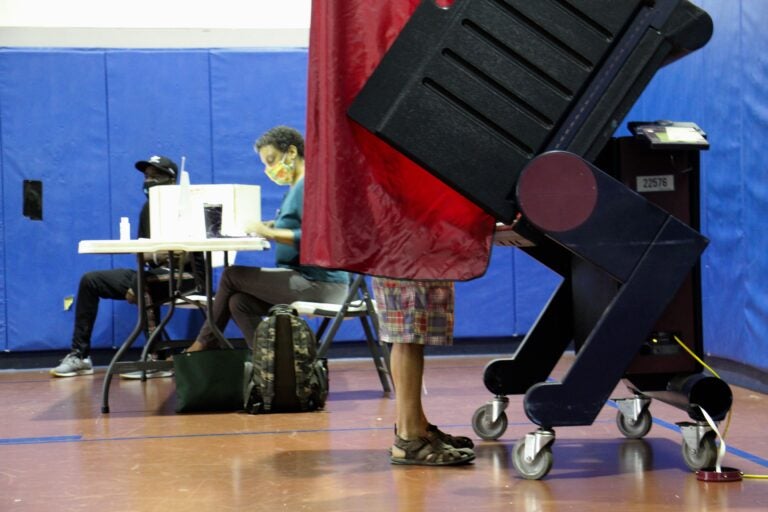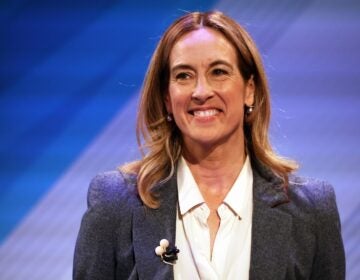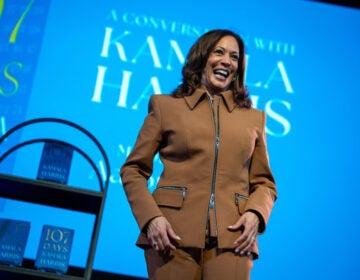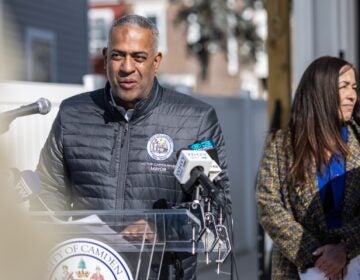3 Democratic candidates for the N.J. Senate primary race are advocating to change the ballot’s design
Due to the Garden State’s ballot that favors endorsed candidates, the candidate in the column with President Biden might be different from county to county.
Listen 1:10
A New Jersey voter casts his primary ballot in person at Sam Naples Community Center in Trenton. (Emma Lee/WHYY)
From Camden and Cherry Hill to Trenton and the Jersey Shore, what about life in New Jersey do you want WHYY News to cover? Let us know.
Because of how New Jersey’s primary process functions, ballots across the state — particularly for the Democratic primary in June — may have a different candidate in the prominent ballot position under President Biden, depending on the county.
The prime ballot spot, known as “the line,” is reserved for the candidate endorsed by the county’s party organization.
As it stands now, in Passaic County, the position will go to First Lady Tammy Murphy. Her rival, U.S. Rep. Andy Kim, will hold the prominent spot in Monmouth County.
Kim and two other candidates — labor leader Dr. Patricia Campos Medina and Newark-based activist Lawrence Hamm — want to change the historical ballot design. The three candidates sent letters to 19 county clerks and Democratic leaders requesting that ballots be grouped by “office block.” An “office block” is when candidates are grouped by the office they are running for.
“[‘The line’] means you’re with a whole bunch of other county party organization endorsed candidates,” said Dr. Ben Dworkin, director of the Institute for Public Policy and Citizenship at Rowan University. “If you’re not on the line, you’re not necessarily in the next column; you could be several columns over.”
Micah Rasmussen, director of the Rebovich Institute for New Jersey Politics at Rider University, expects county chairpersons and clerks to keep ballots as they’re organized currently.
“It’s not that the chairs and the party officials haven’t heard the grassroots support that Andy Kim clearly has demonstrated,” he said. “It’s that they are going to double down on the advantage that their endorsement has and they are going to try and deliver on that.”
The issue with the line has been elevated this year in New Jersey’s Senate primary
This is not the first time the ballot design issue is under scrutiny. It’s long been a controversial element and is the subject of a lawsuit currently in federal court. New Jersey is the only state where the majority of primary ballots are organized by endorsement.
But it wasn’t until this year, Dworkin said, that “the line” emerged as a big issue, after Murphy declared her candidacy.
“Party leaders from across the state went out and endorsed her and promised that they would give her the line,” he said. “It’s always been out there but it now has emerged as a real top issue because it distinguishes one candidate from the other.”
Murphy was not included in the joint letter from the three other candidates. According to Politico, she avoided addressing whether she would forgo “the line.”
“We’ve got a great New Jersey primary system that is set up by statute,” she said. “That’s what it is right now. If the statute should change, then we all operate under a different system.”
It’s unclear if the law guides how ballots are structured.
There is also no uniform structure in how county party endorsements are given to candidates.
In Monmouth County, where Kim earned the endorsement, it was through a party convention. Some counties hold screening committees that interview candidates.
The line does and doesn’t determine whether a candidate wins a primary
Despite party endorsements, New Jersey is an open primary state. Anyone who chooses to vote in-person can declare a political party at their polling location and vote.
Dworkin suggests that keeping “the line” prevents the primary process from being “overwhelmed.”
“It allows for vetting it, allows for appreciation of those who have worked and try to curry support,” he said. “It doesn’t allow some outsider to be able to come in and just take over a party.”
Research has shown that candidates who were on the line won their races by an average of 38 points.
Brian Hughes ended his bid for a sixth term as Mercer County executive after not securing his party’s endorsement. He lost to Dan Benson, who would go on to get elected.
Two decades ago, Nia Gill ran “off the line.” She defeated LeRoy Jones, who is now chairman of the New Jersey and Essex County Democratic parties.
After her district was combined last year with fellow Democrat Richard Codey, a former governor and long-time state senator, she ran off the line again. Gill ultimately lost the primary.
Senate primary pits the establishment versus the grassroots
Rasmussen suggests that the Murphy campaign is based around “the idea of inevitability,” citing the support she has racked up from the county party chairs and her fundraising abilities.
“There is an argument that she is trying to make to Democrats across the state…’I’ve got overwhelming strength and overwhelming support and Andy Kim can’t put a scratch on me,’” he said, adding “that’s not quite the case” based on the endorsement of Kim by Monmouth Democrats.
“Andy Kim did put a dent in her campaign,” Rasmussen continued. “He did have the rank and file support. He did have grassroots support and it looks like he probably will continue to have that support in other counties.”
Murphy trailed Kim by 12% in the first independent poll of the primary, released by Fairleigh Dickinson University earlier this month. However, nearly a third of those polled remain undecided.
Dworkin expects the dynamics of the contest to change as candidates race to the June primary. Incumbent Sen. Bob Menendez has still not indicated whether he is running for reelection. His refusal to resign last September after being indicted on criminal bribery charges sparked the challenges to his Senate seat.
“There’s gonna be a lot of time and a lot of advertising spent on this race,” he said. “We’ll see how things can certainly change.”

Get daily updates from WHYY News!
WHYY is your source for fact-based, in-depth journalism and information. As a nonprofit organization, we rely on financial support from readers like you. Please give today.







